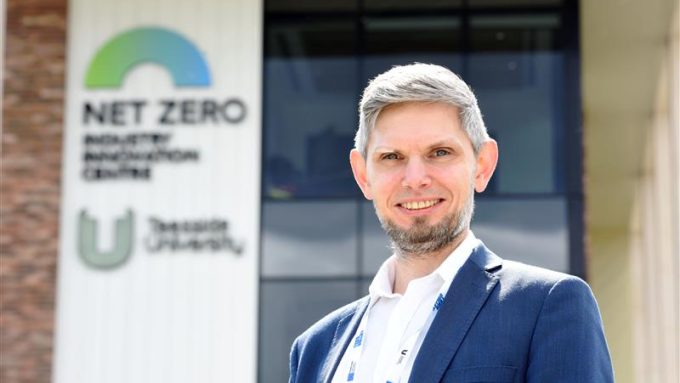
Birmingham accelerator leads software firm to contract win

“If it weren't for DIATOMIC, our deal wouldn't have happened,” says Louis Daillencourt of Novoville; a participant in the DIATOMIC accelerator’s first cohort, run by Connected Places Catapult.
“We co-built a service based on our work through the programme with Birmingham City Council, which led to a pilot and them procuring our product at the end of May. That connection with the council and a six-figure contract with them were made through DIATOMIC. It’s been transformative for our business.”Louis Daillencourt of Novoville
Off the back of the accelerator in 2023 and 2024, Novoville expanded on Shared Works, an online platform allowing residents to stay engaged throughout the installation of retrofit measures to help improve energy efficiency and decarbonise their homes.
For the first six months, Novoville was “in listening mode” speaking to council staff, contractors and residents to find out what their problems were and see how they could be resolved using the platform in a three-month trial.
“Our listening mode covered the whole course of the accelerator, when we didn't actually build anything,” explains Louis. “We engaged and took time to set up relationships, get the right data and have good conversations.”
He acknowledges that large local authorities and contractors who are potential clients often “have a lot of process inertia and haven't already changed the way they work for a reason. It’s never simple”.
Persuading them to try a new approach to delivering their services can be hard, he adds, “but if you don't take time to listen, truly understand the obstacles to tackling their problems, and be ready to ditch your own ideas, you’re not likely to succeed”.
Keeping track of site progress
Shared Works allows residents to learn about and keep track of progress of upgrade programmes on their homes, and co-ordinates directly with contractors and the council throughout the journey.
The system helps to reduce the administrative burden on council officers and contractors by providing a joined-up approach to delivering these home improvements. The council receives data from several firms in a unified format and track progress more easily.
Louis describes Shared Works as a data integration platform; “a place where data about properties, people, projects and programmes can sit and be actioned.

“On top of that data, we create user journeys for the local authority, contractors and residents to help make the delivery of retrofit more efficient for all, and to keep people in the loop. It’s a neater and more seamless way to deliver large scale improvement programmes.”
Louis says the software platform reduces the use of both spreadsheets to manage work and e-mail to communicate with contractors and residents. “Putting a software layer in makes it easier for everyone to access information and improves the quality of engagement.
“We also reduce friction and frustration and provide a better experience for residents, who can log on and see what's happening,” he adds.
Persuading residents to take part
Louis says Shared Works contains details of around 700 properties identified as being fit for retrofit in Birmingham, with dozens more being added every week. But he acknowledges that outside of Government-funded programmes like the Energy Company Obligation (which requires energy suppliers to help households fit energy saving measures) persuading people to begin a programme of upgrade can be challenging.
“Ultimately, we are saying you will need to pay to be disrupted, and the benefits are going to be long term. It’s a hard ask.”
Louis says many residents living in cold or damp homes will likely realise their properties need upgrading in winter, “but then spring comes around, it's no longer cold, and the problem is no longer top of mind”.
He adds that the promise of lower energy bills from a warmer and better insulated home can and should be a big draw. “But the payback period for retrofit is several years, sometimes decades. Telling people they need to spend money now to get a long-term benefit is hard, when it competes with taking children on holiday or buying a new car.”
He says that DIATOMIC was different from several other accelerators “that funnel you into a programme, and accelerate you to nowhere”. You may have finished the programme and got some money, “but did you deliver something of value? Is it embedded in the organisation’s processes?”
In his case, DIATOMIC was a success because it led to a contract, “but it’s not always like that”.
Ambition for a retrofit portal
Louis wants to create “the best product possible and make the platform really easy to use” for residents.
“The sky's the limit and the ambition is high. I would like to help integrate all of the building data in the country and create the country’s de facto retrofit portal; bringing together data that is in silos all over the place.”Louis Daillencourt of Novoville
“But it’s not just about creating a database of buildings showing what they're made of, what interventions have been done in the past, and what can be done to them to make them more liveable. It’s about creating digital pathways so that this data can be used, updated, retained for the future, and made to work.”
At a regional level, the platform is helping to prove that integrating data can help to produce better outcomes, Louis adds.
“When you get it right, innovation is fun and rewarding,” he adds. “But innovation is also hard. It requires a lot of patience and persistence, but also a bit of naivety to think you can do it. When you create something that adds value, though, and start getting that positive feedback, it’s an amazing feeling.”
Applications are open for the next DIATOMIC Accelerator until 31 August, find out more.
The DIATOMIC Accelerator is being led by Connected Places Catapult in collaboration with Birmingham City Council, STEAMhouse and the Greater Birmingham Chambers of Commerce. It is part of the wider West Midlands Innovation Accelerator, funded by UK Government and delivered by Innovate UK, which is designed to bolster the region’s innovation and R&D capability and spark commercial growth and investment. The West Midlands Innovation Accelerator is delivered in partnership with the Department for Science, Innovation and Technology, Innovate UK and the West Midlands Combined Authority.







